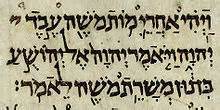"Remember Me, O My God" -- Nehemiah 13:1-9
 Tuesday, February 28, 2017 at 10:13AM
Tuesday, February 28, 2017 at 10:13AM  The Twenty-First (and Final) in a Series of Sermons on Ezra-Nehemiah
The Twenty-First (and Final) in a Series of Sermons on Ezra-Nehemiah
Nehemiah served as governor of Judah for twelve difficult years. Under his very capable leadership, the insults, plotting, and threats made by the Peoples of the Land (led by Sanballat, his lackey Tobiah, and Geshem) against the newly returned exiles had been thwarted. Jerusalem’s walls and gates have been rebuilt in a mere 52 days. Upon the public reading of the Book of Law and with preaching and exhortations from the books of Moses, a reformation broke out in Israel. The people conformed their feasts (i.e., the Feast of Tabernacles) to biblical mandates. They renewed their covenant with YHWH, and according to the testimony of Nehemiah 10:30-39, they swore on oath to separate themselves from the peoples of the land, to stop giving and taking pagan wives, to conduct no business on the Sabbath, and to support the temple and its sacrifices with their tithes. As we saw last time (in chapters 11-12), the people dedicated Jerusalem’s walls and gates to YHWH in a joyful and emotion filled ceremony, which was so loud, the celebration was heard for miles away. If the author wanted to go out on a high note, this is where the Book of Nehemiah should end. But it doesn’t.
His work completed (or so he thinks), Nehemiah is recalled by the Persian king Artaxerxes and leaves Jerusalem behind for the Persian winter capital of Susa, only to return to Jerusalem “after some time.” What does Nehemiah find in Jerusalem upon his return? A people keeping all the promises they made to YHWH when Nehemiah had last been among them? Does he find a people zealous to keep separate from pagan Gentiles? Does he find a people working hard not to neglect the house of their God (the temple) as they promised in Nehemiah 10:39? If we thought the great celebration in Nehemiah 12, was the conclusion to this wonderful story, we are sadly mistaken.
What Nehemiah finds upon his return to Jerusalem is a city and a people living very much as they did before God’s judgment came upon them in 587 B.C. when the Babylonian king Nebuchadnezzar sacked and destroyed Jerusalem as an act of God’s judgment upon Israel because of their sustained idolatry and worship of false gods. Nehemiah is angered by what he finds. The Book which bears his name ends not with the celebration of the dedication of the city (chapter 12:43), but with an epilog in which Nehemiah exercises his righteous anger against those in Israel who have not kept the faith, nor their promises to YHWH. In this we final chapter see the great lesson of the books of Ezra and Nehemiah are intended to teach us–the Old Covenant, that national covenant God made with Israel at Mount Sinai through the mediation with Moses, cannot truly deal with human sin or the sinful human heart. After spending much time studying these two books, one thing should be patently clear–Israel needs a sinless Messiah who can deal with human sin once and for all. Until such a Messiah comes, short term “reformations” are the best the people can hope for or expect. A new and better covenant must replace the old.
As we turn to our text (the closing verses of chapter 12 and the entirety of chapter 13) we pick up where the joyful celebration ends, with the planning and preparation necessary so that the people of Israel might continue to worship YHWH as brought about by and necessary to the renewed covenant. We read in Nehemiah 12:44, that “on that day” i.e., the day (or shortly thereafter) the people of Israel rededicated the city and its walls to YHWH, “men were appointed over the storerooms, the contributions, the firstfruits, and the tithes, to gather into them the portions required by the Law for the priests and for the Levites according to the fields of the towns, for Judah rejoiced over the priests and the Levites who ministered.” Nehemiah wasted no time in ensuring that those things necessary (humanly speaking) for this reformation to continue be put into place. The people of Judah are said to rejoice at these arrangements.
To read the rest of this sermon, Click Here


Reader Comments